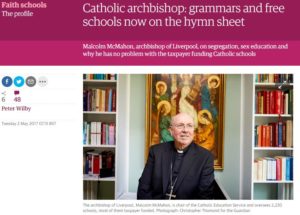“The irony is that faith schools pride themselves on encouraging pupils spiritual and emotional development, and yet to declare homosexuality a sin not only directly subjects LGBT pupils to discrimination, it explicitly hinders their development.”
A potential opt out in the law could allow faith schools to get away with not teaching accurate and evidence-based Relationship and Sex Education (RSE). In March 2017, the Government introduced amendments to the Children and Social Work Bill that proposed to make RSE compulsory in all schools. A step in the right direction one might assume?
Yes, but within these amendments, lies a section stating that any RSE taught in schools must be ‘appropriate having regard to… the religious background of pupils’. This was announced in conjunction with a written ministerial statement from Lord Nash, stating that ‘faith schools will continue to be able to teach in accordance with the tenets of their faith.’ At first glance this statement appears innocuous, and almost more inclusive of different world views, more liberal, and more tolerant. It’s not. It’s insidiously dangerous, less liberal, and less tolerant, and could engender a culture of prejudice and discrimination in faith schools.
Time and time again, we have reported that faith schools are teaching that homosexuality is a sin and that same sex marriage and heterosexual marriage can never be equated, or they are avoiding discussion of LGBT issues altogether, failing to promote equality and respect for LGBT people and relationships. And it was only recently in 2013 that Humanists UK uncovered 45 schools across the UK with RSE policies reflecting the same or similar views to Section 28 of the Local Government Act 1988, which prohibited the ‘promotion of homosexuality by teaching or by publishing material’, even though this law was repealed in 2003.
‘The Equality Act 2010 is actually very clear in prohibiting discrimination on the basis of sexual orientation’
So even before the opt out to the new compulsory RSE provisions emerged, faith schools have long felt entitled to teach this damaging brand of RSE. The reason for this is that despite the fact that the Equality Act 2010 is very clear in prohibiting discrimination on the basis of sexual orientation, many faith schools seem to feel able to get away with teaching a divisive and discriminatory type of RSE due to a perceived grey area in the Act. Or rather, a perceived loophole that some claim legally permits discrimination and prejudice in ‘connection with the content of the curriculum’. You might ask, what exactly does this mean? In 2012, Michael Gove, the former Education Secretary, was asked just this. In a written response, Gove outlined that:
‘The education provisions of the Equality Act 2010 which prohibit discrimination against individuals based on their protected characteristics (including their sexual orientation) do not extend to the content of the curriculum. Any materials used in sex and relationship education lessons, therefore, will not be subject to the discrimination provisions act.’
So far, so unclear. The grey area is as follows. Section 85 of the Education Act 2010 states that a school must not discriminate, harass or victimise pupils, specifically ‘in the way it provides education for the pupil’. And as above the Equality Act 2010 has broad anti-discrimination provisions. However, section 89(2) of the Equality Act 2010 states that, ‘nothing in this chapter applies to anything done in connection with the content of the curriculum’.
However, after a closer inspection of the Act, the ‘explanatory notes’ (a section of the Act written in layman’s terms), reveals that:
‘the prohibitions [against discrimination]… do not apply to anything done in relation to the content of the school curriculum. This ensures that the Act does not inhibit the ability of schools to include a full range of issues, ideas and materials in their syllabus and to expose pupils to thoughts and ideas of all kinds.’
‘The way in which the curriculum is taught is, however, covered by the reference to education in section 85(2)(a), so as to ensure issues are taught in a way which does not subject pupils to discrimination.’
So for clarity, a school under the Act is permitted to teach pupils from a wide range of sources and on a wide range of issues, including, in this instance, controversial and divisive views on homosexuality and issues affecting the LGBT community. However, the school must ensure that such issues are taught in a way that does not subject pupils to discrimination.
The irony is that faith schools pride themselves on encouraging pupils spiritual and emotional development, and yet to declare homosexuality a sin not only directly subjects LGBT pupils to discrimination, it does explicitly hinders their development. Contrary to what some faith schools believe, or what they choose to ignore, presenting discriminatory and biased information in RSE can cause serious emotional and psychological problems, inflicting unnecessary suffering and hurt to individuals all over the world. If such schools feel bound to these views, however, what might be more appropriate, and more in keeping with the Equality Act, would be teach pupils in RSE that different groups of people subscribe to different ideas on LGBT issues. They might teach that some people believe same sex relationships are sinful, but others see them as an expression of love like any other, and as a matter exclusively for the people involved in any case. And they should also teach that the law in this country does not differentiate between same sex marriage and heterosexual marriage.
“Time and time again, we have reported that faith schools are teaching that homosexuality is a sin and that same sex marriage and heterosexual marriage can never be equated, or they are avoiding discussion of LGBT issues altogether”
At this point, you’d be right to ask the question, who exactly is policing what is being taught in our schools, so as to ensure pupils are not be being subjected to discrimination? After all, Ofsted turns up once every few years and even then, they can get it wrong. Given the cases that we have considered above, examining the monumental failings of some faith schools to provide accurate and evidence-based information on same-sex relationships, how can the government continue to put its faith in faith schools to teach an unprejudiced, tolerant, and inclusive RSE, that doesn’t subject their pupils to discrimination, harassment, and victimisation? In short, it can’t – and as the old idiom goes, faith schools are getting off scot-free.
All schools, regardless of their religious character, have a duty to create a safe environment for their pupils to learn in, including safeguarding pupils from abuse. Faith schools that continue to teach inflammatory views on LGBT issues in RSE are breaking a code of ethics enshrined in the profession of teaching. We are hearing all too often about young people, educated in faith schools, experiencing mental-health and self-esteem issues because the school openly criticises those who identify as LGBT and their relationships. With this in mind, the Government must clarify what is and what is not acceptable when it comes to teaching RSE, making clear that when it comes to LGBT discrimination, there are no grey areas in the Equality Act.
Jessica Perera


